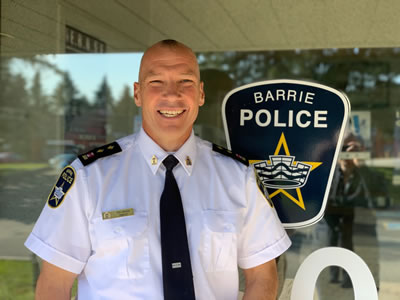BetaGov Interviews
BetaGov spotlight: Rich Johnston, Barrie (Ont.) Police Service

Date: October 15, 2019
Rich Johnston has been a sworn officer for 21 years, first with the Ontario Provincial Police in Northern Ontario, then, since 1998, with the Barrie Police Service. Rich currently holds the rank of Inspector and oversees the community-services, crime-prevention, traffic, marine, tactical-support, canine, court-services, and communications units. He has been working with BetaGov on several randomized controlled trials. Recently, he led an evaluation of the lunar hypothesis with data from his department. He discusses the rationale and experience of finding out that the full moon is not related to calls for service in Barrie!
Why were you interested in looking at a potential relationship between crime and the full moon?.
In discussion with another NIJ LEADS scholar (credit to Jason Potts), he had mentioned his study to look at the lunar phases and whether they did or did not have a correlation to criminal-call volume. Although we work in different countries, there are a great number of shared beliefs (as is common in subcultures). Jason's hypothesis is based on a shared belief here in Canada as well, at least in the "urban legend" category. While initially we looked at mental health calls, we then expanded it to criminal calls to see if results reflected or contradicted Jason's findings. This evaluation also provides a great introductory type study to speak to frontline officers. When speaking about what evidence-based policing is and how it can be operationalized, this type of study resonates with frontline personnel and their interests. It provides a great platform to speak to firsthand or anecdotal experience and the role of research and how it can influence shared beliefs.
What are the perspectives of officers in your department about the relationship between the full moon and crime?
Not surprisingly, many shared the belief that there is a relationship. Interestingly enough, when I debriefed the results with the leadership team at Barrie Police Service, our deputy shared a story about veteran officers picking holidays around the lunar calendar, their seniority allowing them to avoid the "full-moon effect." This demonstrates both how long and how ingrained the belief in the "lunar effect" is.
How did you go about pulling data for this evaluation?
As mentioned, while initially looking at mental health calls, the data pull was incredibly simple. We use Niche RMS (records-management system). It was as simple as querying a date range for each year (Jan 01–Dec 31) for each of the previous four years and then selecting mental health as the call type. Pulling this from the RMS as opposed to the CAD (computer-aided dispatch) allowed me to capture all the calls that may have initially been dispatched as a "violent person" or "suicidal person" that were then changed in the RMS to "found type: mental health." I also selected priority 0, 1, or 2 to capture only the most urgent level of calls. Broadening the study to all the criminal calls required a request to our crime analyst who then pulled the data quite quickly. With respect to the lunar calendar, that was just a simple search on the internet. The task was capturing all the calls that fell on the specific full moon versus new moon days.
What was your reaction when the BetaGov team first briefed you on the lunar-hypothesis findings?
Surprised… but I was good either way. I was prepared to look to have extra personnel staff the full-moon nights if the data showed that there was an actual effect.
What advice do you have for other agencies that might be believe in the power of the full moon on crime?
This is a great way to introduce the value of evidence-based policing, or at least the value of leveraging data to answering a question. The "lunar effect" topic resonates with officers at a human-interest level. We all have someone who knows how to pull the data. If it's a crime analyst at your service/force then you are lucky—they may just need you to explain the relationship you are interested in seeing (as to whether it exists). In the end the important takeaway is that the research should drive the decision making, not the "belief."